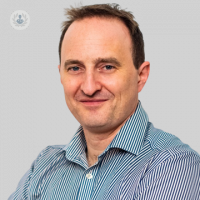What are the main causes of facial skin cancer?
Written in association with:In this article below, experienced consultant oral and maxillofacial surgeon, Mr Ross Elledge, discusses skin cancer on the face, and what to look out for in terms of skin cancer development on the face.

What are the main causes of facial skin cancer?
The main cause of facial skin cancer is UV (sunlight) exposure. Recurrent episodes of sunburn and intense and prolonged sun exposure over a lifetime is the number one cause. This includes using sunbeds on a regular basis that can increase the risk of skin cancer.
What are the main associated risk factors?
The main risk factors include:
- sun exposure
- age (due to cumulative sun exposure over a lifetime)
- previous skin cancer history
- people who have many and/or large moles
- fair-skinned people
- certain genetic factors, e.g. albinism
- previous radiation exposure
- immunosuppression
- certain chemicals/occupational exposure, e.g. coal tar
How can I avoid facial skin cancer?
The main thing is protecting yourself against direct sunlight. People should use sun cream with a high sun protection factor (SPF). Wearing a hat and covering up really helps, as it keeps the direct sunlight off of you. Having an awareness of facial skin changes is also vital, as early detection can cure people of skin cancer progression.
What are the main warning signs?
There are different types of facial skin cancer: non-melanoma (basal cell carcinomas and squamous-cell carcinomas) and melanomas are the broad categories they could fall into, with other rarer types (e.g. adnexal tumours) being exceedingly uncommon.
The melanomas tend to be pigmented (coloured or brown) lesions more often than not, but this is not always the case! By contrast, the others tend to be pink, raised, and potentially ulcerated in many instances.
Look for anything new and atypical is a potential take-home message here and if it feels wrong, get it checked out early! We are particularly looking for any/all of the following signs/symptoms:
- non-healing ulcers for more than four weeks
- changing moles/freckles
- new moles/freckles, particularly later in life
- skin lesions that persist and are itchy, bleed, crust, or scab
- new bumps or patches on the skin
Is skin cancer curable?
BCCs tend to not become life-threatening and generally tend to only invade locally and grow bigger over time (the old-fashioned nickname for them was “rodent ulcers”). SCCs and melanomas can become life-threatening as they can spread to other parts of the body including the lymph nodes and distant organs.
New medical treatments and immunotherapies that have revolutionised treatment for patients diagnosed with skin cancer are available, which greatly increases survival rates and disease control even at advanced stages of these conditions. The bottom line is, earlier diagnosis means catching things early and much lower intensity treatment with excellent outcomes. If patients are in doubt, they should get in touch sooner rather than later!
To book an appointment with Mr Ross Elledge today, simply head on over to his Top Doctors profile.


